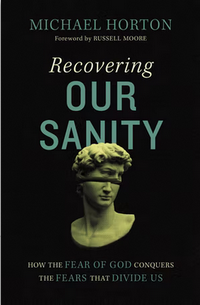 Recovering Our Sanity:
Recovering Our Sanity:
How the Fear of God Conquers
the Fears that Divide Us
DETAILS: Publisher: Zondervan Publication Date: February 14, 2022 Format: Kindle Edition Length: 320 pg. Read Date: February 27-March 13, 2022

Even in more conservative contexts today, the reading of a “fear of God” passage is often quickly followed up with an explanation, dying the death of a thousand qualifications. The upshot is that fear doesn’t really mean “fear.” In such widespread dismissals we are not only failing to give God his due but are depriving ourselves and each other of the only antidote to the crippling fears that haunt us.
…The fear of God leads to trust, and trust bears the fruit of the Spirit, producing a harvest of blessings for ourselves and for others. Fear really is worship— we fear what we believe is ultimate, what we think has the last word over our lives.
What’s Recovering Our Sanity About?
In Part 1, “The Fear to End All Fears,” the goal is to remind readers about the Biblical virtue of the Fear of God—what it means, how it contrasts to other fears, and how when our focus is on the Fear of God, other fears lose significance and power.
In Part 2, “Facing Our Fears with Eyes Raised to God,” Horton puts shoe leather to this understanding of Fear of God vs. other fears. He looks at our fears of death, suffering, disease, the future—and, perhaps most importantly, other human beings.
Confronting Our Fear of Each Other
Once we regain the fear of God— indeed, of Christ as well (he’s not just the friend of sinners but the judge of all)—and face up to who we are before him, coming with empty hands to receive his Son, we’ll begin to lose this fear of the world. We will not be embarrassed when the unkempt widow sings off-key with the gusto of heartfelt conviction or when the building is drab or if we have never had a brush with greatness and our pastor has never been photographed with anybody in the news. The faithful preaching of the Word, baptism, and the Lord’s Supper; the gracious care, encouragement, and warnings of elders and the wider body; the extension of Christ’s love for temporal needs through the deacons; common prayers, singing, confession of our faith and of our sins, Christ’s declaration of forgiveness, and even God’s greeting at the beginning and his benediction at the end— all these will seem so marvelously familiar and new to us at the same time. And then we will begin to not need the world’s affection any longer.
Roughly the last third of the book is taken up by the third part of Part 2, “Confronts Our Fear of Each Other.” In this Horton talks about the fear we have of other Christians and other people outside the Church—there’s a focus on social and political issues and how American Christians ought to react to them instead of how we tend to. Horton avoids a “Left Wing” or “Republican” response—finding positive things on both sides of an issue (many of which shouldn’t find binary responses, but it seems impossible for Americans to do anything else), as well as things to critique on both sides.
Horton goes out of his way not to demonize those who disagree, but reminds his readers that there are those on each side who are fellow image-bearers, and all need Christ more than they need to be corrected or encouraged about their stances on any issue. The Church’s calling is to set aside the focus on the temporal and point others to the eternal and the world to come, while showing our gratitude for Christ’s work by serving those around us.
This sub-section is worth the price of the book (not that the rest was a waste).
So, what did I think about Recovering Our Sanity?
My goal in this book is not to take sides in cultural and political debates. Instead, it is to raise our eyes to heaven so that our sanity can be restored, as Nebuchadnezzar experienced in Daniel 4.
There were more than a few times where I wondered if Horton had lost track of the thesis of the book—I found each chapter, each topic that he covered very valuable and was impressed by the wisdom that Horton offered.
But I was wrong about that—and by the end, it was easier to see where he was going all along. Horton’s been one of those writers that have been helpful to me for a couple of decades now and it’s good to see that hasn’t changed.
There’s a lot to chew on here, and as I said, a lot of wisdom to be gleaned. I can’t imagine every reader is going to agree with everything he has to say (and I can’t believe that Horton expects that, either)—but his major points are sound, Biblical, and needed by the American Church so that we remember what our priorities are supposed to be.

This post contains an affiliate link. If you purchase from it, I will get a small commission at no additional cost to you. As always, opinions are my own.
![]()



Read Irresponsibly, but please Comment Responsibly